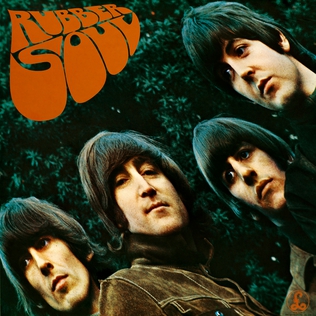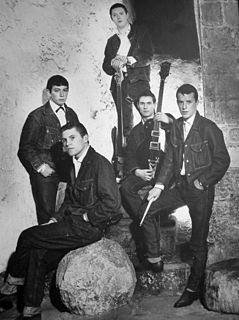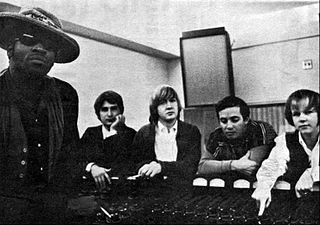Related Research Articles

Psychedelic rock, also referred to as psychedelia, is a diverse style of rock music inspired, influenced, or representative of psychedelic culture, which is centred on perception-altering hallucinogenic drugs. The music is intended to replicate and enhance the mind-altering experiences of psychedelic drugs, most notably LSD. Many psychedelic groups differ in style, and the label is often applied spuriously.

Jefferson Airplane was an American rock band based in San Francisco, California, that became one of the pioneering bands of psychedelic rock. Formed in 1965, the group defined the San Francisco Sound and was the first from the Bay Area to achieve international commercial success. They were headliners at the Monterey Pop Festival (1967), Woodstock (1969), Altamont Free Concert (1969), and the first Isle of Wight Festival (1968) in England. Their 1967 break-out album Surrealistic Pillow ranks on the short list of the most significant recordings of the Summer of Love. Two songs from that album, "Somebody to Love" and "White Rabbit", are among Rolling Stone's "500 Greatest Songs of All Time".

Rubber Soul is the sixth studio album by the English rock band the Beatles. It was released on 3 December 1965 in the United Kingdom, on EMI's Parlophone label, accompanied by the non-album double A-side single "Day Tripper" / "We Can Work It Out". The original North American release, issued by Capitol Records, contains ten of the fourteen songs and two tracks withheld from the band's Help! album. Rubber Soul met with a highly favourable critical response and topped sales charts in Britain and the United States for several weeks.

The Animals were an English rhythm and blues and rock band, formed in Newcastle upon Tyne in the early 1960s. The band moved to London upon finding fame in 1964. The Animals were known for their gritty, bluesy sound and deep-voiced frontman Eric Burdon, as exemplified by their signature song and transatlantic number-one hit single, "The House of the Rising Sun", as well as by hits such as "We Gotta Get Out of This Place", "It's My Life", "Don't Bring Me Down", "I'm Crying", "See See Rider", and "Don't Let Me Be Misunderstood". The band balanced tough, rock-edged pop singles against rhythm and blues-oriented album material and were part of the British Invasion of the US.

Pet Sounds is the 11th studio album by the American rock band the Beach Boys, released May 16, 1966 on Capitol Records. It was initially met with a lukewarm critical and commercial response in the United States, peaking at number 10 on Billboard Top LPs chart, lower than the band's preceding albums. In the United Kingdom, the album was favorably received by critics and peaked at number 2 in the UK Top 40 Albums Chart, remaining in the top ten for six months. Promoted there as "the most progressive pop album ever", Pet Sounds attracted recognition for its ambitious production, sophisticated music, and emotional lyric content. It is considered to be among the most influential albums in music history.

Country Joe and the Fish was an American psychedelic rock band formed in Berkeley, California, in 1965. The band was among the influential groups in the San Francisco music scene during the mid- to late 1960s. Much of the band's music was written by founding members Country Joe McDonald and Barry "The Fish" Melton, with lyrics pointedly addressing issues of importance to the counterculture, such as anti-war protests, free love, and recreational drug use. Through a combination of psychedelia and electronic music, the band's sound was marked by innovative guitar melodies and distorted organ-driven instrumentals which were significant to the development of acid rock.

The Music Machine was an American rock band formed in Los Angeles, California in 1966. Fronted by chief songwriter and lead vocalist Sean Bonniwell, the band cultivated a characteristically dark and rebellious image reflected in an untamed musical approach. Sometimes it made use of distorted guitar lines and hallucinogenic organ parts, punctuated by Bonniwell's distinctively throaty vocals. Although they managed to attain national chart success only briefly with two singles, the Music Machine is today considered by many critics to be one of the groundbreaking acts of the 1960s. Their style is now recognized as a pioneering force in proto-punk; yet within a relatively short period of time, they began to employ more complex lyrical and instrumental arrangements that went beyond the typical garage band format.

Rising Sons was an American, Los Angeles, California-based blues rock and folk music band, which was founded in 1965. Their initial career was short-lived, but the group found retrospective fame for launching the careers of singer Taj Mahal and guitarist Ry Cooder.

The Misunderstood were an American psychedelic rock band originating from Riverside, California, United States in the mid-1960s. The band moved to London early in their career, and although they recorded only a handful of songs before being forced to disband, they are considered highly influential in the then-emerging genre.
The Deep was a short-lived American psychedelic rock band made up of musicians from New York City, who in 1966 traveled to Philadelphia to record a one-time LP, Psychedelic Moods. The band was experimentally progressive, as they were one of the earliest groups to record psychedelic music, before it was adapted by a wider array of musical acts. Although their only album failed to achieve success, it later gained acclaim for being considered the earliest work to reference "psychedelic" in its title.

Espers was an American psychedelic folk band from Philadelphia, United States, that was part of the emerging indie folk scene. They formed in 2002 as a trio of singer-songwriter Greg Weeks, Meg Baird and Brooke Sietinsons but later expanded to a sextet including Otto Hauser, Helena Espvall and Chris Smith. Their music is reminiscent of late-sixties British folk as well as many contemporary folk acts. Most of the band's members have also featured on recordings by a number of other folk artists such as Nick Castro and Vashti Bunyan and as a result have become an important part of the psychedelic folk revival.
Psychedelic music is a wide range of popular music styles and genres influenced by 1960s psychedelia, a subculture of people who used psychedelic drugs such as LSD, psilocybin mushrooms, mescaline and DMT to experience visual and auditory hallucinations, synesthesia and altered states of consciousness. Psychedelic music may also aim to enhance the experience of using these drugs.

"Stealin" is an American blues song from the 1920s. It originated with jug bands, but gained wider popularity after several 1960s contemporary folk musicians recorded it. Although various artists have recorded different verses, the chorus has remained consistent:

The discography of The Animals, an English music group of the 1960s formed in Newcastle upon Tyne, contains 20 studio albums, six compilation albums, five EPs and 25 singles. Featuring a gritty, bluesy sound and a deep-voiced frontman in Eric Burdon, they are best known for their rendition of an American folk song named "House of the Rising Sun", which is described by many as their signature song. This single had worldwide sales of nearly 5 million and became a Number One hit in both the UK and US in 1964. Overall, the group balanced tough, rock-edged pop singles such as "We Gotta Get Out of This Place" and "It's My Life" against rhythm and blues–oriented album material. The Animals released separate UK and US albums, a practice common to other British Invasion bands of the time such as The Beatles and The Rolling Stones.
"The House of the Rising Sun" is a traditional folk song, sometimes called "Rising Sun Blues". It tells of a person's life gone wrong in the city of New Orleans; many versions also urge a sibling or parents and children to avoid the same fate. The most successful commercial version, recorded in 1964 by the British rock band the Animals, was a number one hit on the UK Singles Chart and also in the US and France. As a traditional folk song recorded by an electric rock band, it has been described as the "first folk rock hit".
The Crusaders was an American garage rock band, whose 1966 album Make a Joyful Noise with Drums and Guitars is considered one of the first gospel rock releases, or even "the first record of Christian rock".

The Daily Flash are an American folk rock and psychedelic band founded in 1965, active until 1968 and reformed in 2002. originally based in Seattle and later in Los Angeles. The group was composed of guitarist/singer Steve Lalor, lead guitarist Doug Hastings, bass player/singer Don MacAllister and drummer Jon Keliehor. According to Mike Stax, they "had become a major force in the growing Seattle underground scene by 1965." Their sound, which incorporated elements of folk music and jazz as well as rock stood in contrast to the garage rock sound typical of the Pacific Northwest at the time, anticipating the sound that came to be identified with San Francisco.
Eternity's Children was an American sunshine pop band that originated in Cleveland, Mississippi as a folk group known as the Phantoms. The Phantoms began with two students, composed of vocalist/keyboardist Bruce Blackman and drummer Roy Whittaker. Soon, the group added lead guitarist Johnny Walker, rhythm guitarist Jerry Bounds, and bassist Charlie Ross, and began developing the complex, overlapping vocal harmonies that were utilized when they became Eternity's Children in 1967. Their one and only hit, "Mrs. Bluebird", topped at number 69 on the Billboard Hot 100.
The Hard Times were an American folk rock band formed in San Diego, California in 1965. Combining elements of folk, sunshine pop, and light psychedelic pop, the group became a well-attended attraction on the Sunset Strip as house band to music venues such as the Whisky a Go Go. They managed to reach the Billboard Hot 100 with a cover version of Allen Toussaint's song "Fortune Teller" in 1966.
Christopher Lloyd Darrow was an American multi-instrumentalist and singer-songwriter. He was considered to be a pioneer of country rock music in the late-1960s and performed and recorded with numerous groups, including Kaleidoscope and the Nitty Gritty Dirt Band.
References
- 1 2 3 4 5 6 7 Unterberger, Richie. "Deep Six: Artist Biography". AllMusic. All Media Network, LLC. Retrieved November 24, 2015.
- 1 2 3 4 5 6 "The Deep Six - The Deep Six, 1966, Liberty Records". last.fm/music. last.fm/music. Retrieved November 24, 2015.
- 1 2 3 "Listen to the Psychedelic Folk Music of The Deep Six: The whole album from 1966". Dangerous Minds. Dangerous Minds. June 30, 2011. Retrieved November 24, 2015.
- ↑ "The Deep Six - The Deep Six (1966 us, lovely vocal sunny folk)". Plain and Fancy. Plain and Fancy.com. September 3, 2013. Retrieved November 24, 2015.
- ↑ "The Deep Six". Discogs. Discogs®. Retrieved November 24, 2015.